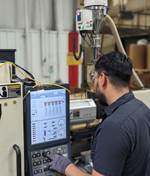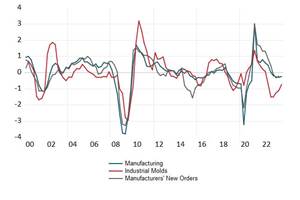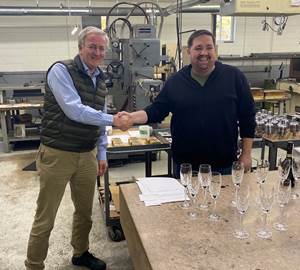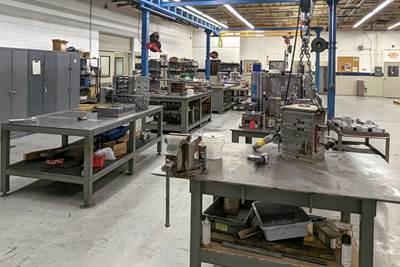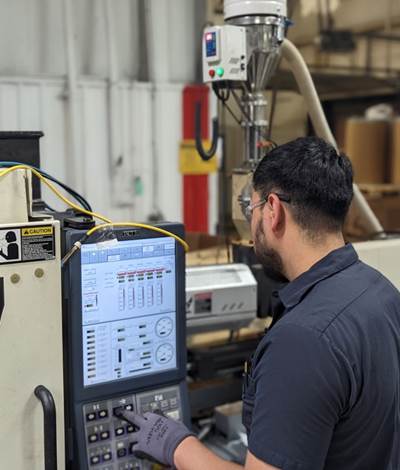
Pyramid Molding Group and Lettuce Grow's collaboration on the Nook showcases technical expertise, innovation and effective project management. Source (All images) | KD Shah / Pyramid Molding Group
Pyramid Molding Group (PMG), a domestic mold builder and plastic injection molder based in Rockford, Illinois, partnered with Lettuce Grow to develop tooling for the second generation of its innovative hydroponic plant stand. This project involved collaboration on the technical considerations, cost management strategies and project management approaches necessary to successfully complete the project — from designing and manufacturing the tooling to molding and adjusting the tooling for the final parts.

Lettuce Grow created "The Nook," a hydroponic plant stand. For budget-friendly and efficient production, they chose United States-based Pyramid Molding Group to handle both moldmaking and molding processes.
Lettuce Grow, best known for its Hydroponic Farmstand, set out to develop a smaller version called “The Nook” suitable for homes and apartments. Originally, the company planned to get the tooling overseas but ultimately decided to keep the project within the United States. This choice was driven by the company realizing it could stay within its budget and take advantage of a seamless, all-in-one solution provided by PMG.
“We decided to keep the project in the United States to support local sourcing and strengthen community ties, aligning with our commitment to sustainability and local economies. By staying in the United States, we also avoided sending staff to China for tool validation and adjustments,” says Jacob Pechenik, CEO of Lettuce Grow.
Tooling Considerations
PMG collaborated with Lettuce Grow to identify the most cost-effective tooling options while ensuring the product's design and functionality remained intact. Since the design was already largely determined, PMG focused on making tweaks to reduce tooling costs while maintaining functionality.
PMG collaborated with Lettuce Grow to optimize tooling costs while preserving the product’s design and functionality. The engineering team used Moldex 3D to analyze parts and make informed design changes.
PMG’s in-house engineering team carefully evaluated mold gate types and design options to ensure optimal part quality and functionality. “We evaluated various gate locations for the different parts to balance flow, minimize defects and enhance the overall aesthetics of the final product. The choice of gate types was critical in achieving efficient filling and maintaining the structural integrity of the components,” Raymond Gibler II, PMG Operations Manager, says.
Lettuce Grow was also concerned with fit and function and wanted to ensure optimal water flow for plant growth in the Nook. To further refine the mold design, PMG used Moldex3D to conduct fill analysis on parts that incorporated a cold sprue. These analyses provided insights into the flow patterns and potential issues, enabling PMG to make informed adjustments to the design and ensure uniform filling and minimal warpage.
Design for Manufacturability
Throughout the design phase, PMG’s engineering team provided valuable input based on moldability considerations. “We implemented Design for Manufacturability (DFM) principles to streamline the production process. By creating detailed design concepts for all tools, we established a solid road map for our designers,” says Gibler.

A big advantage of working with a domestic manufacturing partner who offers both mold building and molding capabilities is improved quality control.
Certain parts required a more in-depth DFM approach due to their complexity, ensuring that the designs were optimized for efficient and cost-effective manufacturing. PMG worked in partnership with Lettuce Grow to create revisions to the design to gain functionality for the overall product.
Lettuce Grow also prioritized minimizing waste, so PMG used post-consumer materials. They also assisted with product packaging development, as PMG would ultimately assemble and ship the finished Nook directly to consumers.
“Since we were ultimately packaging and shipping the product direct-to-consumer, we collaborated with Lettuce Grow to make sure we used as little packaging as possible for sustainability while still providing safety for the product,” says Gibler.
Lettuce Grow chose to keep the project within the United States, recognizing the advantages of working with a local partner including quality control, shorter lead times, reduced transportation costs and a simplified supply chain.
Project Management
To manage the project, PMG held frequent design reviews. Lettuce Grow was assigned a dedicated point of contact at PMG to oversee the tool build, with bi-weekly meetings scheduled to discuss updates on DFMs and part design.
During the early stages of the project, frequent design reviews were conducted to discuss part changes and moldability concerns. These collaborative sessions ensured both teams were aligned on design objectives and enabled PMG to address potential issues proactively.
Lettuce Grow prioritized waste reduction by using post-consumer materials, with PMG aiding in product packaging development and handling assembly and shipping of the Nook.
Improved communication led to better timing, convenient meetings and swift issue resolution. “We operated as a one-stop shop and handled all tooling-related aspects as part of our project management,” says Gibler.
Regular touch-base meetings led to the successful production of the tooling. Lettuce Grow invested time upfront to ensure the product met its requirements, resulting in minimal engineering changes after the T0 sample.

Manufacturing in the United States. with Pyramid Molding Group, Lettuce Grow ensures quality, meets demand and refines products through flexible collaboration.
The collaboration between Pyramid Molding Group and Lettuce Grow on the Nook hydroponic plant stand succeeded in bringing a complex assembly to life, reflecting the strength of the partnership and the quality of work that can be achieved with the right technical expertise, innovative problem-solving capabilities and effective project management.
“PMG played a crucial role in our product development by being flexible and understanding. They accommodated numerous design iterations, which enabled us to refine our product to meet the highest standards while keeping the manufacturing in the United States.,” says Pechenik.
Related Content
MMT Chats: Digitalizing Mold Lifecycle and Process Performance
MMT catches up with Editorial Advisory Board member Bob VanCoillie senior manager of Kenvue’s mold management center of excellence outside of Philadelphia to discuss mold management via tooling digitalization and OEM expectations and opportunities.
Read MoreInternational Partnership Improves IBM Preform Precision
Hammonton Mold Co. and ADOP France team up to bring injection blow mold preform design and service to the next level.
Read MoreNavigating Economic Resilience and Consumer Trends
Consumer behavior provides mold builders insight into the evolving market dynamics of goods and services that helps strategic planning.
Read MoreHammonton Mold, ADOP France Forge Strategic Partnership in Injection Blow Moldmaking
Hammonton Mold Inc., a leading full-service mold shop based in New Jersey specializing in injection blow molds (IBM), proudly announces its official partnership with ADOP France, a prominent IBM mold manufacturer based in Normandy, France.
Read MoreRead Next
How to Successfully Reshore Tooling
Sloan Valve and Pyramid Molding Group shed light on the dynamics and challenges surrounding the shift toward domestic mold sourcing and the advantages of collaborating with a U.S. supplier to bring tooling back stateside.
Read MoreAutonomous Machine Vision Improves Injection Molding Quality at Pyramid Molding Group
Pyramid Plastics recently installed its 5th Keyence Vision system to reliably detect the presence of inserts before the molding of the part.
Read MoreMMT Chats: The Merging, Marketing and Manpower of a Moldmaking/Molding Company
For this MMT Chat, my guest is Andy Peterson CEO of Pyramid Molding Group (Industrial Molds and Pyramid Plastics) in Rockford, Illinois, who shares his take on the strengths of bringing a mold shop and molding facility together under one group.
Read More



